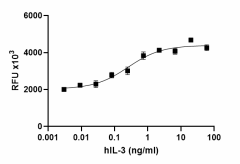- Other Names
- Interleukin-3, Burst promoting activity, Eosinophil colony stimulating factor (Eo-CSF), Hematopoietic cell growth factor (HCGF), Mast (MGF/MCGF), Multi-colony stimulating (Multi-CSF), P cell stimulating activity (PCSA), Thy1 inducing factor

-

Recombinant Human IL-3 induces the proliferation of TF-1 human erythroleukemic cells in a dose-dependent manner. The ED50 for this effect is 0.25 – 1.25 ng/mL.
| Cat # | Size | Price | Quantity Check Availability | ||
|---|---|---|---|---|---|
| 564314 | 25 µg | $595.00 | |||
| 564316 | 100 µg | $1650.00 | |||
Interleukin-3 (lL-3) is a hemopoietic growth factor involved in the survival, proliferation, and differentiation of multipotent hemopoietic cells. In addition to granulocyte-macrophage colony-stimulating factor (GMCSF) and IL-5, IL-3 is the most potent growth factor for basophils. On mature basophils, these three cytokines act through specific receptors mediating adhesion, migration, and releasability. Mast cells express high amounts of IL-3. In the absence of antigen, rapid release of large amounts of IL-3 in an autocrine dependent manner is responsible for mast cell survival. IL-3 plays a vital role in stimulating basophil and mast cell responses to parasite infections. IL-3 has also been implicated in the pathogenesis of several chronic inflammatory diseases, including asthma, atherosclerosis, and neurodegenerative disorders, such as multiple sclerosis. IL-3 stimulates colony formation of megakaryocytes, neutrophils, and macrophages from bone marrow cultures. IL-3 is expressed in the major embryonic vessels and regulates the survival and proliferation of hematopoietic stem cells in the early stages of embryonic development.
BioLegend Cell-Vive™ GMP Recombinant proteins are manufactured and tested in accordance with USP Chapter 1043, Ancillary Materials for Cell, Gene and Tissue-Engineered Products and Ph. Eur. Chapter 5.2.12 in a dedicated GMP facility compliant with ISO 13485:2016. Specifications and processes include:
- Low endotoxin level (≤ 0.1 EU/μg)
- Purity (≥ 95% or higher)
- Bioburden testing
- Mycoplasma testing
- Batch-to-batch consistency
- Vendor qualification
- Raw material traceability and documentation
- Documented procedures and employee training
- Equipment maintenance and monitoring records
- Lot-specific certificates of analysis
- Quality audits per ISO 13485:2016
- QA review of released products
Product Details
- Source
- Recombinant human IL-3, amino acid sequence containing Ala20-Phe152 (Accession No. NP-000579), was expressed in E.coli. The carboxy-terminus contains a linker-6His tag.
- Molecular Mass
- The 146 amino acid recombinant protein has a predicted molecular mass of approximately 16.24 kD. The DTT-reduced and non-reduced proteins migrate at approximately 16 kD - 18 kD by SDS-PAGE. The predicted N-terminal amino acid is Ala.
- Purity
- ≥ 95%, as determined by Coomassie stained SDS-PAGE
- Formulation
- 0.22 μm filtered protein solution is in PBS, pH 6.5.
- Residual Host Cell Protein Content
- ≤ 0.500 ng/μg by ELISA
- Concentration
- 25 μg and 100 μg sizes are bottled at 0.5 mg/mL
- Storage & Handling
- Unopened vial can be stored between 2°C and 8°C for up to 2 weeks, at - 20°C for up to six months, or at -70°C or colder until the expiration date. For maximum results, quick spin vial prior to opening. The protein can be aliquoted and stored at -20°C or colder. Stock solutions can also be prepared at 50 - 100 μg/mL in appropriate sterile buffer, carrier protein such as 0.2 - 1% endotoxin-free BSA or HSA can be added when preparing the stock solution. Aliquots can be stored between 2°C and 8°C for up to one week or stored at -20°C or colder for up to 3 months. Avoid repeated freeze/thaw cycles.
- Activity
- Recombinant human IL-3 induces the proliferation of TF-1 human erythroleukemic cells. The ED50 for this effect is 0.25 – 1.25 ng/mL. The specific activity of Cell-Vive™ GMP Recombinant Human IL-3 (carrier-free) is ≥ 1.6 x 105 IU/mg when compared against the WHO International Standard for human IL-3 (NIBSC code: 91/510).
- Application
-
Bioassay
- Application Notes
-
BioLegend carrier-free recombinant proteins provided in liquid format are shipped on blue-ice. Our comparison testing data indicates that when handled and stored as recommended, the liquid format has equal or better stability and shelf-life compared to commercially available lyophilized proteins after reconstitution. Our liquid proteins are verified in-house to maintain activity after shipping on blue ice and are backed by our 100% satisfaction guarantee. If you have any concerns, contact us at tech@biolegend.com.
- Disclaimer
-
BioLegend Cell-Vive™ GMP Recombinant proteins are for research use only. Suitable for ex vivo cell processing. Not for injection or diagnostic or therapeutic use. Not for resale. BioLegend will not be held responsible for patent infringement or other violations that may occur with the use of our products.
Antigen Details
- Structure
- Monomer
- Bioactivity
- Measured by its ability to induce the proliferation of TF-1 human erythroleukemic cells.
- Cell Sources
- Activated T cells, Th1, Th2, mast cells, eosinophils, keratinocytes, NK cells, and endothelial cells
- Cell Targets
- Erythroid cells, megakaryocytes, neutrophils, eosinophils, basophils, mast cells, monocytic lineages
- Receptors
- Heterodimeric receptor formed by IL-3Rα (CD123) and a common β subunit (βc) that is shared with the IL-5R and GM-CSFR
- Antigen References
-
- Kitamura T, et al. 1989. J Cell Physiol. 140:323-34.
- Kohno M, et al. 2005. Blood. 105:2059-65
- Murphy JM and Young IG. 2006. Vitam Horm. 74:1-30.
- Kleemann R, et al. 2008. Cardiovasc Res. 79:360-76.
- Valent P and Dahinden CA. 2010. Curr Opin Hematol. 17:60-6.
- Mirza S, et al. 2010. J Biol Chem. 285:2237.
- Bénard A, et al. 2021. Nat Commun. 12:1112.
- Regulation
- IL-3 is a pleiotropic factor which promotes both self-renewal and differentiation of early multipotential progenitors and is involved in inducible hematopoiesis in response to infections.
- Gene ID
- 3562 View all products for this Gene ID
- UniProt
- View information about IL-3 on UniProt.org
